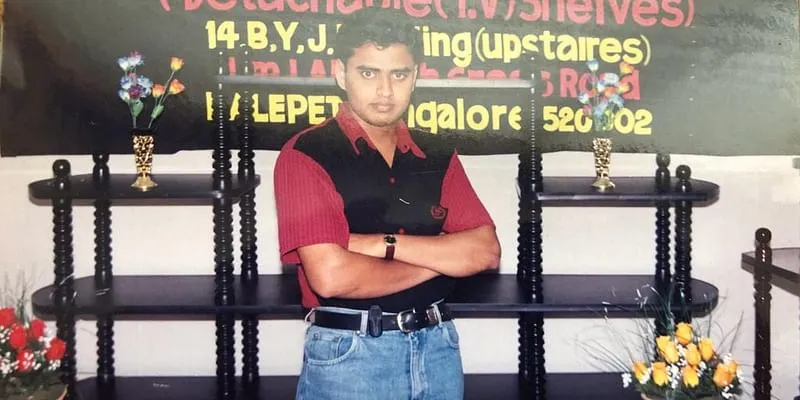Value over valuation: How bootstrapped Royal Oak made it big in the furniture industry
Furniture company Royal Oak’s journey has been nothing less than a roller-coaster ride–it went from being on the verge of shutdown to a Rs 400-crore turnover pan-India brand.
Launched in 2010, homegrown furniture brand seems on track to becoming one of India’s leading furniture brands.
However, despite operating from Bengaluru, India’s startup capital that ranked fifth in the world for tech VC investments in 2022, the company has chosen to remain bootstrapped. This despite competing with newer brands like , , , etc, which have grown quicker and faster.
Royal Oak could have taken the external funding route a long time ago, but founder Vijai Subramaniam says the biggest stumbling block was “the way startups operate”.
“I have risen from poverty. I know the struggle and effort that go into building a business. Startups focus on valuation, but I operate my business by sticking to core values,” Vijai tells SMBStory.
He says that startups tend to do business by discounting and selling, but Royal Oak doesn’t have that approach; instead, the founder says their product offerings and understanding of the customer's demand help them stand out. “We don’t lure customers with discounted prices; we give them what they demand, “ he says.
But Vijai’s confidence and success didn’t come overnight. A struggle of almost 20 years helped him build a business that reported a Rs 401 crore turnover as of March 2022.
Rising from poverty
Vijai hails from Munnar, a hill station in Kerala, and comes from a very humble background. In 1995, when he was in his second year of college, he would sell tea leaves and powders to local shops to earn money and fund his education.
After completing his graduation, he enrolled himself for a master’s course, but quit since he was the sole breadwinner in the family.
“I just had a handful of money and a relative said he could get me a job in Singapore. But days passed and he cheated on me. My money was finished and I was nowhere,” he recalls.
Vijai then decided to move out of Munnar as it was a “small town with limited opportunities” and made his way to Palakkad. He started working as a credit card agent at Standard Chartered Bank where he did well but seemed to rankle his colleagues. The option was to move again, to Chennai.
“I came to Chennai in 1997. I had rented a place to stay but had no work. But, as they say, destiny always has a plan,” he says.
Vijai decided to join a government exhibition where a vacant stall caught his attention. Despite being short of money, he booked the stall, paying Rs 2,800 for 10 days, and bought plastic household items to sell. Surprisingly, his stall sold out!
He started traveling across South India, participating in all government-organised exhibitions. which then took him to Bengaluru, where he decided to put down his roots.
“By this time I was in my late 20s and my family wanted me to get married. But I didn’t have a stable income, house, and identity,” he says.
In 2001, he set up a stall at Safina Plaza in Bengaluru–this was the turning point in Vijai’s life. He was now operating under the label Fashion Decors, which had become popular for in-demand TV stands.
A big opportunity knocked on his door soon: Big Bazaar approached him to set up a store in one of their first outlets in the Madiwala area.
“The opportunity was big and so was the rental but I took a leap of faith. I had a hard time doing business with BigBazaar but it helped build my career. By this time I had made a house, bought a car and even got married,” he recalls.
But Vijai had bigger dreams. “I thought of starting my own store,” he says.

Vijai during early days of his business.
The inception of Royal Oak
In 2004, Vijai opened his first store in a rented space at CMH Store under the name Oak & Oak. He started with TV stands and gradually forayed into footstools and other small furniture products. The products were sourced from a local manufacturer. A challenge–and opportunity–cropped up when the demand for imported Chinese furniture grew.
By 2005, Vijai had set up a supply chain to get local and imported furniture. Business was up and running and he expanded dealing in wholesale to local furniture businesses, growing significantly around 80% year on year, and even directly importing from China.
By 2010, he set up another store in Banaswadi and that was the birth of Royal Oak.
But getting his furniture brand off the ground wasn’t easy. Vijai struggled with compliances and was on the verge of shutting down. “It sounds filmi, but I recalled all my struggles, saw the employees I was responsible for, and soldiered on.”
Vijai relaunched Royal Oak in 2015. He streamlined operations, organised supply chains, and put processes in place. In eight years, his company has grown significantly–there are now 150 Royal Oak stores across India, besides a presence online through Royal Oak’s website, ecommerce players like Amazon, Flipkart, etc.
“We are Karnataka’s No 1 one furniture brand,” claims Vijai, adding that during the pre-pandemic, they had 50 stores, and he credits the growth to his employees and family.
Vijai claims that Royal Oak is looking to clock Rs 1,000 crore turnover in the next two years.
Challenges and the way ahead
Vijai’s journey has taken him from the traditional to modern, and he has seen dynamic changes happening in the business world.
“New-age entrepreneurs are well-read, tech-savvy, and they know innovation. But I don’t compete with them. Yes, they are better than me but I play strongly in the experience I have,” he says.
Vijai has received multiple partnership requests from investors but he wants to ensure full control of his business. “I see furniture brands that surpassed my turnover in the early days of their inception but I don’t have any regret. I love the pace at which I am working.”
On challenges, he lists labour retention and the tendency of people to buy foreign brands.
Talking about future plans, Vijai says he is targeting 300 more stores across the country by next year along with 200 franchise stores and create 5,000 jobs.
Edited by Teja Lele







